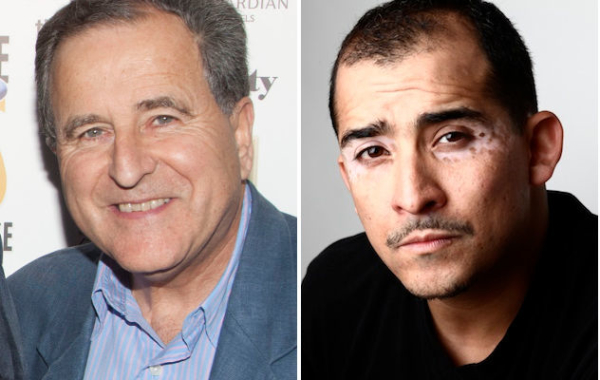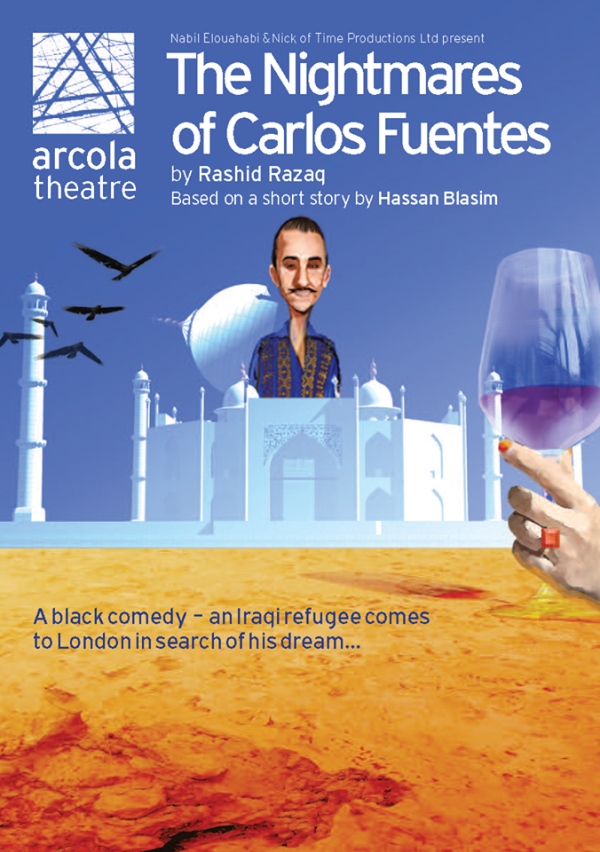Nicolas Kent and Nabil Elouahabi on The Nightmares of Carlos Fuentes
‘We’ve been shoulder-to-shoulder, like Butch Cassidy and the Sundance Kid’

© Dan Wooller / Nabil Elouahabi
Actor Nabil Elouahabi (24, Top Boy) and director Nicolas Kent (formerly artistic director of the Tricycle Theatre) are collaborating on and co-producing The Nightmares of Carlos Fuentes. Written by Rashid Razaq, the play is based on a short story by Hassan Blasim which follows Salim, an Iraqi refugee, as he attempts to take on a new identity in London after fleeing persecution in Baghdad. The production runs until 16 August 2014 at the Arcola Theatre in Dalston.
What was the genesis of this production?
Nabil Elouahabi: I came across Hassan Blasim's short story in 2009 when I was asked to do an audiobook. I was struck by it, and thought there was something interesting about the piece that deserved to be seen. So I mentioned the book to Nick when we were working on The Great Game season at the Tricycle, and he enjoyed it, so we set about finding a writer. I suggested Rashid Razaq, who I'd worked with previously, and he wrote a draft which Nicolas liked. That was about 18 months ago so we've been developing it since then to get it to where it is now. Nick and I have been shoulder-to-shoulder, like Butch Cassidy and the Sundance Kid!
Nicolas Kent: I thought it was a wonderful piece of writing. Hassan is an award-winning writer on a par with the greats like Marquez. When Nabil gave it to me I thought it would be difficult to do on stage because of the elements of magical realism, but Nabil saw something in it and Rashid has turned it into something both enormously funny and very poignant. It lasts an hour and a half straight through and there's not a boring minute in it.
How pertinent are its themes of immigration and identity?
Nabil Elouahabi: Well we couldn't have predicted when we first looked at this story the extent to which sectarian violence would have flared up by the time we came to perform it. We just felt it was a powerful story about many themes – identity, displacement, assimilation. And being from immigrant parents myself, these are themes I've always identified with. But tragically the context of the story could hardly be more topical considering the current situation in Iraq.
Nicolas Kent: It's about a Sunni who is married to a Shia, which obviously chimes with current events in Iraq. But as Nabil says we couldn't have foreseen the rise of ISIS, and simultaneously the debate over British identity sparked by the European elections. The hero of the play is an Iraqi who takes the name Carlos Fuentes because he thinks not having an Arab name will make things easier for him in the UK. The predominance of London's population are either immigrants of the sons and daughters of immigrants – my parents were refugees from Hitler – and we have to find a way to integrate people and enjoy and share each other's cultures to prevent people resorting to fundamentalism.

Despite these heavy themes it's billed as a black comedy
Nabil Elouahabi: At the heart of it is a human story. What I found most attractive about it was not the politics but the man at the centre of it, and his relationship with a woman. Their desire to be compatible in the face of history causes them all kinds of problems, so in that sense it's about the human condition and humour is a big part of that.
Nicolas Kent: Absolutely. And I really do want to emphasise that it's funny and entertaining as well as being politically charged. It's just a really good evening at the theatre.
Nick, this is your first production as a director since leaving the Tricycle – how does that feel?
Nicolas Kent: It's lovely to be back in the saddle. It's obviously quite stressful for Nabil and myself being the producers as well as the actor and director – I'm used to having a large organisation behind me so it takes a bit of adjustment. But it's fun to feel like Butch Cassidy and the Sundance Kid jumping into the Grand Canyon!
Nabil, you're a busy man with a lot of film work, how did you fit this project in?
Nabil Elouahabi: The project was actually born out of my frustration at a lack of work, and of interesting characters that I could play. I wanted to create the kind of work I wanted to see. We see immigrant stories through a certain prism, I think. Generally speaking we tend to be on the periphery of stories, so in a sense I'm trying to change the theatrical lens. I think we often undervalue the popularity of minority stories and characters. For example, recently I was in Top Boy on Channel 4, which featured predominantly black characters, and it was a huge success. If the stories are good, people will connect.
Nick – do you agree with Nabil that these stories are marginalised?
Nicolas Kent: I do, and there's a wider problem in the industry at the moment caused by the cuts, which is that actors on the whole are working for a pittance. In a way it's become a volunteer industry, which I'm very distressed by. The arts earn a huge amount of money for this country and they need investment, which gradually this government has been withdrawing. I want to see the arts ring-fenced in the way that overseas development is. The arts are a great platform for social healing and integration.
What's next for you both?
Nabil Elouahabi: I'm just looking forward to getting Carlos Fuentes on its feet – it's been a great journey and I hope that all the energy and integrity we've given to the piece will come across to audiences at the Arcola. It's been a real learning curve and I hope to stage more projects like it in the future.
Nicolas Kent: I'm collaborating with Jemima Khan on a series of plays about drones which we're been working on for about two years and I'm hoping will see the light of day next year. They're somewhat similar to The Great Game or Women, Power and Politics seasons I did at the Tricycle. I'm also working with the BBC on a series of political plays which will take over Radio 4 for a week next year.
The Nightmares of Carlos Fuentes runs at the Arcola Theatre until 16 August












